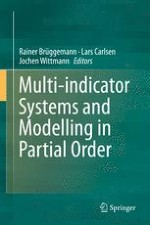2014 | OriginalPaper | Buchkapitel
9. Partial Orders in Socio-economics: A Practical Challenge for Poset Theorists or a Cultural Challenge for Social Scientists?
verfasst von : Marco Fattore, Filomena Maggino
Erschienen in: Multi-indicator Systems and Modelling in Partial Order
Verlag: Springer New York
Aktivieren Sie unsere intelligente Suche, um passende Fachinhalte oder Patente zu finden.
Wählen Sie Textabschnitte aus um mit Künstlicher Intelligenz passenden Patente zu finden. powered by
Markieren Sie Textabschnitte, um KI-gestützt weitere passende Inhalte zu finden. powered by
